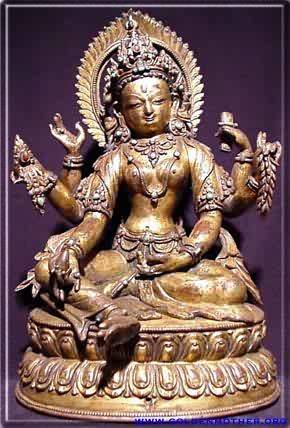
Vasudhara
Buddha of financial prosperity

Treasury
Goldhord
Capital
The Keep
Financial Well-being
Connect (11) and Collect (2)
The Keep
“There are people who have money and people who are rich.”
- Coco Chanel
" It is preoccupation with possessions,
more than anything else,
that prevents us from living freely and nobly."
~~Principia Mathematica 1872-1970 philosopher Bertrand Russell
" Some men worship rank, some worship heroes, some worship power, some worship God, and over these ideals they dispute and cannot unite -- but they all worship money."
"Prosperity is only an instrument to be used,
not a deity to be worshipped."
~~ POTUS-30 Price of Freedom 1872-1933 Calvin Coolidge
The wealth of the rich is their fortified city;
they imagine it a wall too high to scale.
~~ Proverbs 18: 11, New International Version
" Success is not to be measured by how much material wealth is possessed,
but whether you are able to create at will what you need."
~~
Autobiography of a Yogi 1893-1952 Swami Yogananda
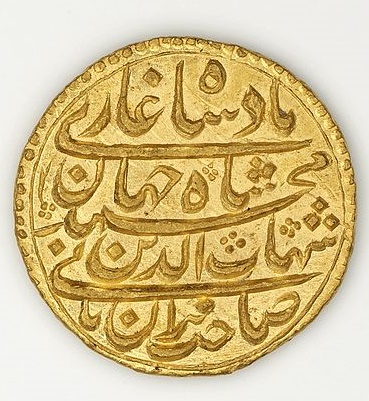
A gold Mohur from the reign of Mughal Emperor 1592-1666 Shah Jahan
"Now, another belief is that you need money to have whatever it is you desire.
Well, you know, that is a very grand belief. You believe that you can only be successful if you have money in the bank. What an extraordinary belief that is!
And you see, beloved peoples, when you put your power into the belief about money, you are denying your own creativity.
Because your power is that you may create whatever it is that you desire and you truly do not need this intermediary called " money."
So if it is that you are desiring something to be brought forth into physical reality and you say, ican only have it when I have the money to buy it," what you are doing is cutting down millions of possibilities ."
Stash * Cache * Case * Casket * Cachot
Store * Storage * Storehold * Restoration * Restaurant *
Silo
Heap * Hoard * Herd * Hold * Hutch
Keep * Catch * Clasp * Clutch
Bounty * Bank
Assets * Acquisition
Save * Conserve * Reserve * Preserve
Contain * Maintain * Sustain * Retain * Tenacity * Attention
Colleci
Gather
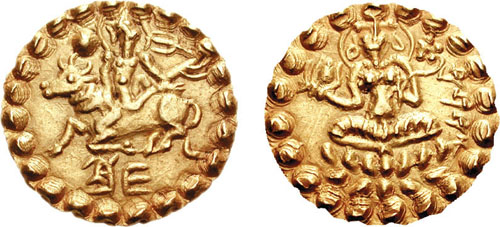
Lakshmi Bull gold coins = circa 600 AD = regime of Shashanka
en.wikipedia.org/wiki/Sasanka
from the Kingdom of Gauda (now Bangala = Bengal)
King James Version , c. 1611-CE
" No man can serve two masters:
for either he will hate the one, and love the other;
or else he will hold to the one, and despise the other.
Ye cannot serve God and mammon."
QUOTATION from
God's Dream 1931- Anglican Archbishop Desmond Mpilo Tutu
" You can never win a war against terror as long as there are conditions in the world that make people desperate - poverty, disease-discomfort, ignorance, et cetera.
I think people are beginning to realize that you can't have pockets of prosperity in one part of the world with huge deserts of poverty and deprivation and think that you can have a stable and secure world."
" No servant can serve two masters: for either he will hate the one, and love the other; or else he will hold to the one, and despise the other. Ye cannot serve God and mammon."

Apple Computer 1955-2011 Steve Jobs
lemma = Mammon (n.)
- from Late Latin mammona,
- from Greek mamonas,
- from Aramaic mamona, mamon "riches, gain"
- left untranslated in Greek New Testament (e.g. Matt. vi:24, Luke xvi:9-13)
- retained in the Vulgate,
- and regarded mistakenly by medieval Christians as the name of a demon.
[BPL adds: the fertile goddess "Moneta" (ma-mona, atitle of Juno and accolade of the Moon) was divine patroness of the coin-stamping factories of Rome, and from her name comes the English word "money" .]
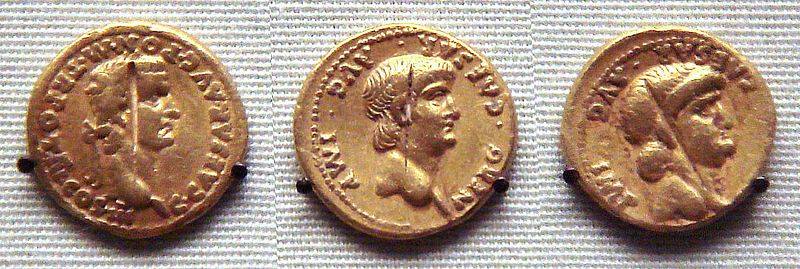
Image: Roman gold coins excavated in Pudukottai India, one coin of Caligula and two coins of Nero. Credit: British Museum
copied from Rare Book Society of India. Text from The Commerce Between The Roman Empire And India by E.H. Warmington. Cambridge University Press (1928)
Book extract:
" The firm establishment of Augustus in the principate brought peace and prosperity, and since much trade shifted from the near East to Rome, the Mediterranean Sea had become filled with merchants, and the fashionable world began to demand oriental luxuries on a scale unknown before, brought by Greeks, scythians, Jews, and Arabians in Greek vessels, true Romans (resident not farther east than Asia Minor) helping them with moneyed capital when it was needed. The main channel for these luxuries through the Mediterranean was the sea-voyage from Alexandria to Puteoli, and so we Naturally, turn to look at the “province” of Egypt first and to consider the relations of that important territory with India.
Arabia and India became better known through frequent trading; one hundred and twenty ships (presumably Egyptian) left for the East every year, visiting India and the Somali in fleets which brought back precious freights to Alexandria — a city which controlled the trade, distributed cargoes to other regions, reaped double customs-dues, and attracted foreigners to a degree above all other marts. He emphasises the importance of Myos Hormos and Berenice in this traffic. The merchants who visited India, not yet knowing the best use of the monsoons, coasted all the way in small vessels, perhaps sometimes sailing across from Has Eartak to the river Indus. In constant dread of the inhospitable and uncivilised Arabian coast and of the shoals in the Red Sea, they sailed under armed guards and with the help of professional guides down the middle of that long gulf or near its western side and called at Adulis (Zula, the present port being Massowa) chiefly for African wares, then on the east side at Muza (Moklia), and having taken in water at Ocelis (near Celia) near Cap'e Acila at the Strait of Bab-el-Mandeb proceeded into the Indian Ocean and found Indians and Indian wares in African marts of the Somali, in Socotra Island, but above all at Arabia Eudaemon (Aden) , aprosperous and wealthy meeting-place of Creeks, arabians, and Indians. Farther along, in Hadramaut, cane (Hisn Chorab) and Moscha (Khor Eeiri), both trading with India, invited a call. Leaving out most of the Persian Gulf, men coasted along until they reached Barbaricon on the Indus, where Indian, tibetan, persian, and Chinese goods could be obtained.
Further sailing to the south brought them to the Gulf of Cambay and the Saka mart Barygaza (Broach) on the Nerbudda. Local marts along the coast of India could be visited under the supervision of Andhra rulers who controlled much of the western and eastern shores, but the chief goals were the three Tamil States of South India — (a) the Chera Kingdom, controlling Generally, the sea-coast from Calicut to Cape Comorin, and possessing the famous pepper-marts, muziris (Cranganore) and Nelcynda (Kottayam), though the latter may have passed already to (b) the Pandya Kingdom, occupying roughly the districts of Madura and Tinnevelly and bounded on the S. and S.E. by the north coast of the Gulf of Manaar to the Palk Strait — a kingdom famous for its pearls of Kollcai; (c) the Chola Kingdom stretching along the eastside of India from the Vaigai, or at least the Valiyar to Nellore and the river Pennar, and famous for its muslins cii). Ceylon, sending its products to these Tamil peoples, was known to but not visited by Roman aobjects who however, according to Strabo, were penetrating to the Ganges by sea in small numbers.
He says that their visits to India and the Ganges were rare and hasty, and complains of the unscientific nature of their reports and, as a result, he relies much upon earlier Hellenistic writers, gives no details about the Indian peninsula, and ignores the tributaries of the Ganges. Possibly the Greeks were quite unacquainted yet wth the proper use of the monsoons even for coasting and for sailing to the Indus, though some think otherwise { Roman subjects did not reside Yet, in India, nor did many Indians visit Alexandria, for Cleopatra gave audience to Ethiopians, trogodytes, Hebrews, arabs, syrians, medes and Parthians; no Indians are mentioned."

Material wealth, acquisitions of lineage values-fulfillment ,
accumulation of natural resources , sensual permission, beauty, face, hair
retained income, store-holds, silos, storage lockers, banks, gainfulness,
food, mouth, taste, speech, teeth
knowledge of languages and history, historical records, old stories and songs,

These Shukra-ruled portions are also gifted in diplomacy, music, arts, and design
The final outcome of financial behaviors must include a full analysis of the bhava 2-5-8-11 along with all characteristics of Shukra. However, the se particular Shukra-ruled portions are Generally, inclined toward Luxury-Laxmi, pleasure and wealthr.
Shukra-ruled Nakshatra of Chandra
Chandra in Bharani - Yamya * needs to carry valuable burdens * safeguards the treasuries * protects precious values
-
Moonies 1920-2012 Rev. Sun Myung Moon [Somana-yuti-Ketu]
-
Das Kapital 1818-1883 economics Karl Marx + [Surya-yuti-Rahu]
-
England-Queen 1533-1603 Armada Elizabeth-1-Tudor
Chandra in Pūrvaphalgunī - Yonī
-
Newspapers 1863-1951 plutocrat William Randolph Hearst [secretive-disguising Pūrvaphalgunī-4]
-
POTUS-36 Great Society 1908-1973 Lyndon Baines Johnson + [Surya-yuti-Kuja + [Somana-yuti-Guru] (10)
Chandra in Pūrvāṣāḍhā - Apah
-
USA-Treasury 1755-1804 Federalist Papers Alexander Hamilton [patriotic-defensive Mūla-4] + [Mūla-Budha-yuti-Chandra] [Mūla-Budha-yuti-Mangala-Mūla] + [Mūla-Budha-yuti-Shani-Vaishva]
Shukra-ruled indriya-lagna
-
Cuba-Dictator 1926-2016 Fidel Castro
-
Banker to the Poor 1940- microcredit Muhammad Yunus
Pūrvāṣāḍhā - Apah - Apah
-
England-Queen 1533-1603 Armada Elizabeth-1-Tudor
-
UK Princess 1982- Catherine Duchess of Cambridge
-
Graceland 1945- drama-homeware Priscilla Beaulieau Presley
QUOTATION 300 Combinations 1912-1998 Jyotiṣika B. V. Raman commentary on Madhya Vayasi Dhana Yoga
" A perusal of astrological literature bearing up ''Wealth" reveals clearly that in order to become rich, one should have in his horoscope
-
combinations which comprehend a point of contact between lords of Lagna, 2nd hoard, 11th gains, 5th luck and 9th wisdom.
-
Permutations and combinations of these lords give rise to a stupendous number of Dhana Yogas."
Yoga for material Wealth
According to 300 Combinations 1912-1998 Jyotiṣika B. V. Raman, goldhord wealth derives from two groups of planetary yoga:
-
Involving bhava-5 + bhava-9 = fortune through expressions of genius intelligence (5) and wisdom understanding of the interactions between human and divine (9)
-
Involving bhava-2 + bhava-11 = family lineage hoards of knowledge and money (2) and personal gainfulness via friendly association in the marketplace (11)
QUOTATIONS from www.etymonline.com
lemma = Wealth
Wealth
-
c.1250,"happiness,"also"prosperity in abundance of possessions or riches," from M.E. wele "well-being" ..."
Weal
-
well-being,, o.E. wela wealth, in late O.E. also welfare, well-being,
-
from W.Gmc. *welon , from PIE base *wel-" to wish, will .
Money
-
c.1290,"coinage, metal currency," from O.Fr. moneie , from L. Moneta "mint, coinage," from Moneta, atitle of the Roman goddess Juno, in or near whose temple money was coined."
Luxury
-
1340,"lasciviousness, sinful self-indulgence," from O.Fr. luxurie, from L. luxuria "excess, luxury," from luxus "excess, extravagance, magnificence," probably a fig. use of luxus (adj.) "dislocated," which is related to luctari "wrestle, strain." Lost its pejorative taint 17c. "
-
Karnesha navamsha Ruler
-
gainfulness in 12 sthāna
-
Planetary yoga = dhanesha-treasurer-2
-
Money-Maker Graha per 12 Lagna
-
Money is always a result, never a cause
-
BPHS Dhana Bhava bhava-2 [Sarga-2]
-
BPHS key wealth yoga (Sarga-41)
-
BPHS wealth indicators (Sarga-13)
-
B.V. Raman's Dhanayoga - from 300 Important Yogas
-
For the Simha nativity, Budha activates 2 + 11 thus the financial situation of marketplace revenues (11) + savings (2) depends largely on the condition of the Kumara.

Yaksha-gana-Karnataka
What is a Yaksha? /en.wikipedia.org/wiki/Yaksha

EXAMPLES: Financial Wealth
Royalty and Celebrity
-
England-King 1491-1547 Henry-8-Tudor hT re-appropriated the vast landed properties of the Roman-Rite adherent Church into the English economic reserve
-
England-Queen 1533-1603 Armada Elizabeth-1-Tudor= treasure from the sea-trade, notably piracy
-
UK Queen 1819-1901 Empress Victoria-1 * British Commonwealth treasure the sun never sets
-
UK-Queen 1926- Elizabeth-2 + UK-Prince Consort 1921- Philip Mountbatten= treasure via royal entitlements = tax-free real estate
-
POTUS-pair-35 editor 1929-1994 Jackie Kennedy Onassis = treasure from inheritance, additional treasure by marriage
-
Yentl 1942- drama-song-activist Barbra Streisand = treasury via musical + dramatic performance, touring, scriptwriting, media productions, cinematic rights. Noted financier of political initiatives.
-
King of Pop 1958-2009 Thriller Michael J. Jackson= via musical performance, royalties on lyrics from music catalogue. Philanthropist for children's charities.
-
Friends 1969- drama-fashion Jennifer Aniston treasure: dhanapati-2+Dharmesha-9 [uchcha-Shukra-yuti-Rahu] + vidya-pati-5 Shani; Vriddhi-pati-11 Chandra in Chandra-Mangala Yoga, in bhava-3 for self-made financial wealth .
-
Socialite 1963- beauty pageants Marla Maples Trump fleshbirth 1963 = treasure via marriage
-
TM 1917-2008 Maharishi Mahesh Yogi = treasure via copyrighted meditation-technique program
Bankers + Financiers + Industrialists
Standard Oil 1874-1960 philanthropy John D. Rockefeller * treasure from inheritance; financier. Distinguished Philanthropist.
Open Society 1930- currency-values George Soros
Berkshire Hathaway 1930- mutual funds Warren Buffett = investment portfolio
+ dhanayoga Budha-2 rules 11 via [uchcha-Hasta-Budha-yuti-Shukra-Chitra-nīcha -bhanga] + [Punarvasu-Guru-yuti-Mangala-Arudra] [11]
Gospel of Wealth 1835-1919 Andrew Carnegie * US-Steel/Carnegie Steel = Steel factories, oil, telegraph, railroads, bridges. Distinguished Philanthropist.
General Electric 1847-1931 Thomas Edison * product patents + stock dividends.
Ford Motor Co. 1863-1947 assembly line Henry Ford * from manufacturing, automobile industry
Newspapers 1863-1951 plutocrat William Randolph Hearst * treasure via inheritance, massive forested lands, paper mills, and a castle, notorious newspaper and cinema empire
General Electric 1935-2020-CEO Jack Welch= treasure via salary, luxury perquisites, and corporate stock; manufacturing, distribution, acquisitions, tax-sheltered finance
CNN buffalo lands 1938- Ted Turner treasure via salary, perquisites, and corporate stock; communications media and real estate
Oracle Database 1944- Larry Ellison treasure via salary, perquisites, and corporate stock; computer software
POTUS-45-47 Play to Win 1946- Beauty Pageants Donald Trump = via real-estate deals, television performance, politics
Best Is Yet to Come 1949-2022 designer Ivana Zelnickova Trump via marriage, litigation including divorce-settlement, real-estate and self-owned home-decoration commerce . Philanthropist.
"O" 1954- multimedia Oprah Winfrey fleshbirth 1954 = via communications media productions. Philanthropist.
Microsoft 1955- philanthropist Bill Gates = via salary, perquisites, investments in multiple companies; and corporate stock in own company; mainly computer software and related technology; philanthropist.
Apple Computer 1955-2011 Steve Jobs = treasury via salary, perquisites, and corporate stock; mainly computer hardware-software;
QUOTATION from Sarvartha Chintamani ; Sarga-2, shloka-7
" When the planet occupying the Navamsha
[lagna] is powerful, the acquisition of financial wealth will be without much effort.
Should it be weak, alittle wealth will accruer.
The country where the native will acquire wealth will be signified
-
by the sign representing the 10th house
-
or the Navamsha owned by the lord of the 10th house.
But, when this Sign is occupied or aspected by its lord,
-
the native will earn in his own country .
So it shall be if the Navamsha occupied by the lord of the 10th house is an immovable sign.
When the said sign is owned or aspected by planets other than its lord,
-
the person concerned will earn in the place other than his own country.
The livelihood is also determined from
-
the nature of the planet who rules the Navamsha sign occupied by the lord of the 10th house."
|
Goldhord Treasury * Storage * Containment - Material Wealth The greater the interaction between these primary wealth indicators, the greater the luxury of financial wealth . |
|
|
Key wealth indicators: 1, 2, 5, 9, 11 |
|
|
Additional finance bhava :3, from-Chandra |
|
| Dushthamsha lords combined with the bhratru-pati-3 for self-made-wealth via commerce = money-makers. |
Das comments = "The lord of the 3 is in 8, aND the lord of the 3 conjoins the lord of the 6 OR the lord of the 3 conjoins the lord of the 8 OR the lord of the 3 conjoins the lord of the 12." " You may amass good amount of financial wealth ." |
|
Angles |
|
| BPHS Ch ....Shloka-2 5 |
" Should one, two, or all three of Guru, Shukra , and Chandra be in the 7th trust from Lagna Pada, the native will be very wealthy." |
|
Karaka graha: |
|
|
Confirming varga: |
|
Inheritance Monies from Parents = 5th-from-4th = 8
Inheritances emerge from 5th-from-4th = bhagya-fortunes (5) from the parents (4)
Matters of 5th-from-4th (among other material-social outcomes of bhava-8) emerge during
-
periods of the randhra-pati
-
periods of graha occupying the weird 8th-amsha
-
periods of ruler of the revolutionary, emotionally turbulent, perpetually transformative, trauma-inducing 8th-from-Chandra (although this is usually an emotional-mental outcome rather than material-social)
outcomes follow a pattern of
- emergence of the previously merged,
- disclosure of the previously closed
-
sudden appearance of previous hidden assets
" Moderation is a fatal thing. Nothing succeeds like excess ." ~~ Oscar Wilde
Career-Profession distinguished from Income-Profits
Professor Shani is the natural governor of bhava-10 and bhava-11. However, bhava-11 is co-ruled by Rahu.
Bhava-10 and bhava-11 both produce social-material outcomes, but bhava-10 and bhava-11 have two different functions.
Bhava-10
Career itself = a running obstacle course (car/cour means running, going as in cart or courier or correo-areo or golf-course or blood coursing through veins).
Navamsha of karmesha-10 as well as the ruler of the navamsha-10th are predictive elements which contribute toward a fuller profile of the career.
10 = 12th-from 11th
A widely recognized public profile for a socially important career often drains the economic gainfulness due to bhava-10 being 12th from 11th. The social importance and respect attributed to one's career is often disproportionate to economic income. The notoriety of career does not determine income. Indeed, astrong career that is comprehensively concerned with regulatory decision-making may well be a hindrance to individual economic activity as one becomes so involved in the duties of leadership that profitability is ignored.
-
POTUS-33 Trial and Hope 1884-1972 Harry Truman completed a demanding eight years as POTUS-33 and world leader, only to meet an impecunious retirement.
Bhava-11
To determine social-material gainfulness, assess conditions of bhava-11.
Look to relationship between the career profile (10) and the elements describing the 11th-bhava of economic gain, such as
- 11th navamsha
- 11th radical bhava
- the rulers,
- the emotionally associative, community-linking, economically gainful, profit-regulated, friendly, participatory, goal-oriented, socially-networked 11th-from-Chandra,
- 11th-from-11th (bhava-9)
- other 11th-from indicators of social-material gainfulness.
11th angles determine participation in the economic systems, and the level of privilege enacted via this participation is what determines the social-material goal achievement including salary, rents, royalties, dividends, commissions, etc.
Having determined the scope of economic gainfulness, then proceed to examine bhava-2 savings, collections, bank-account, containment, the keep, the coop. The relationship between bhava-11 income and bhava-2 savings can reveal the relationship between what is earned and what is retained.
A high income is not necessarily a predictor of substantial treasury. If the income is spent and not saved, material value accumulation is not realized. In capitalistic economies, in order to produce treasure-collections, some considerable portion of the earnings (11) must be retained to be used as capital (2) for further investment.
Lao-Tse
" Continuing to fill a pail after it is full, the water will be wasted.
Continuing to grind an axe after it is sharp, will wear it away.
Excess of light blinds the eye.
Excess of sound deafens the ear.
Excess of condiments deadens the taste.
He who possesses moderation is lasting and enduring.
too much is always a curse, most of all in wealth."
Bhartrihari's Nitishatakam 71
" Like a tree laden with ripe fruits bends naturally,
so do gentle people display all the more humility when blessed with abundance."
Bhojacharitra , 60
" Generally, it is the rich who have a strong desire for riches."
In Jyotisha, there are four main treasure bhava
- bhava-2- capitalization, animal herds, hoards of valued commodities, collections, databases, and libraries, storage knowledge of history, knowledge of languages, speech, song, family assets -- together with bhava-3 = 2nd-from-2nd indicating entrepreneurial business, which is typically funded from family monies
- bhava-5- venture capitalism, speculative finance, having fun with money, gambling, games of chance, winning prizes for creativity, celebrity entitlements
- bhava-8 - tax avoidance, offshore banking, hidden assets, in-laws
- bhava-11 - awards granted for Work Accomplished, rents, royalties, commissions, dividends, bonuses, salaries, economic revenues, marketplace profits
2nd hoard and 2nd-from-2nd capital invested into commerce
- banked savings; gathered seeds and genetic materials, herds of animals, historic collections, databases and warehouses, contained natural resources; assets provided to be used in support of lineages of value and knowledge. Bhava-3 2nd-from-2nd represents the management of these treasuries
5th gaming
- gambling profits or speculative wins; venture capitalism; creative finance; assets provided to be used in support of children and the creative arts
8th secret undisclosed treasuries of material goods and 2nd-from-8th = 9th wisdom of dharma * trained, initiated ability to recognize the ever-present resources available to those who can see the field of energy patterns
- Bhava-9 is not acquisitive but it will direct one to locate what is needed, when it is needed ; assets provided to be used for support of faith or to provide spiritual guidance; earnings of the community (11th from 11th)
11th economic gains
- earned income via
distributive and associate exchange networks; rents,
royalties,
dividends,
commissions,
bonuses,
paychecks,
et-cetera;
assets provided to be used in support of one's community
[Sweetly Suave Shukra] = Gathering , pleasuring, Luxury
In Jyotisha, the karaka for a topic should be examined before evaluating the smaller details such as yoga, drishti, bhava-rulership, etc..
As the dhana-karaka representing accumulated wealth, Professor Shukra can be extremely influential in matters of learning, knowledge of history and languages, music, money and sensual luxury.
Shukra's condition can influence the overall pattern of capital accumulations, gambling wins, and marketplace incomes within the nativity.
Shukra vs. Guru
The only source of financial wealth that Shukra does not affect, because it is not held or stored, is the wealth which arises from wisdom-perception (Guru, 9). In fact, the dharma (reality) of abundance is always fully present, but the density of human filters often blocks perception of its existence. Doctrines that are variously labeled as humanistic, religious, theoretical or philosophical may provide teachings which illuminate the path toward understanding [Guru] the patterns which indicate the presence of unlimited resources. Shukra prefers a materialistic filter while Guru prefers a philosophical filter; thus the types of wealth revealed by the two filters are somewhat incommensurable and perhaps incompatible as well (see bhava-9, below).
-
Mangala = the Hunter.
-
Shukra = the Gatherer.
Shukra = a magnet that attracts sensual pleasures and yokes the source of those pleasures into a contractual balance. The magnetically attractive powers of a strong Shukra can trump any number of anti-wealth yoga. The strongest positions of Shukra are Generally, the [uchcha] shukra, [nīcha-bhaṅga] shukra, and the Shukra-specific Malavya Yoga.
And the converse is also true: a weak or compromised position of the daityaguru generally points to a low-functioning pleasure magnet that implies non-hoarding or even anti-hoarding behavior.
Empowered Shukra = a reliable indicator of energized acquisitiveness, which is much enhanced through the agency of partnership. For masculine Learners, sweet Shukra additionally indicates the beauty of the feminine partner. For Feminine Learners , lovely Professor Bright Beautiful Bhrigu = indicator of her own entitlement to validation for her beauty, her grace, her artistic sensibilities, and her ability to attract luxurious pleasures.
Disempowered Shukra = inability or unwillingness to gather . When the gathering karaka is not energized, the Learner may lack an impetus to collect and store the excess material resources that create the hoard
Treasury accumulations are developed during Shukra Mahadasha.
Building
Un-building
during the 20-yr Shukra Mahadasha, each of the nine bhukti are the maximum length, longer than any other bhukti of that graha within the Vimshottari dasha.
-
The possibility of two favorable bhukti in sequence, for example the bhukti of a graha in 2nd hoard from Shukra followed by the bhukti of a graha in 5th luck from Shukra, could build The financial wealth measurably.
-
Conversely, two conjoined uncomfortable bhukti during the Shukra Mahadasha, for example the bhukti of a graha which is 12th-from (ghosts) Shukra followed by the bhukti of a graha which is located in the notoriously less benevolent 4th roots-from Shukra, may cause severe financial deficiencies.
Shukra lagna
Shukra's bhava forms a wealth lagna from which the effect of other bhava upon wealth may be measured.
-
Graha yuti Shukra will amplify and diversify the material acquisitions.
-
Graha in 2nd hoard from Shukra = conservative, savings effects, increase the treasury holdings
-
Graha in 3rd craft from Shukra = producers of self-earned wealth, Usually, via hand craft or projection of the face - voice
-
Graha in 4th roots from Shukra = poorly positioned. During the Vimshottari period of Shukra + this graha, emotional problems cause a stoppage of financial wealth -gathering.
-
Graha in 5th luck from Shukra = wealth from speculative ventures, gambling, and general bhagya fortune .
-
Graha in 6th fight from Shukra = large debts, unfair expenses caused by disputes, treachery, broken promises or medical ailments, bail payments, unjust penalties and fines, lack of financial support from partners, general failure to meet the terms of material agreements.
-
Graha in 7th trust from Shukra = contributions of the partner toward one's own wealth
-
Graha in 8th weird from Shukra = hidden wealth reserves. Surprising, even shocking emergence of financial wealth such as inheritance. Spousal monies.
-
Graha in 9th wisdom from Shukra = wealth from religion, philosophy, higher teachings both given and received.
-
Graha in 10th law from Shukra = wealth from leadership responsibilities
-
Graha in 11th gains from Shukra = wealth in the form of income from participation in social and conceptual networks. If this bhava is air element, wealth from scientific technology.
-
Graha in 12th ghosts from Shukra = material losses. If the graha in 12th ghosts from Shukra happens to be Shani or Ketu, there can be stupendous losses leading to material poverty during the Shukra-Shani or Shukra-Ketu bhukti . (Ketu is worse in this regard.) the Learner may benefit spiritually from this period of material dissolution but the survival threat is genuine.
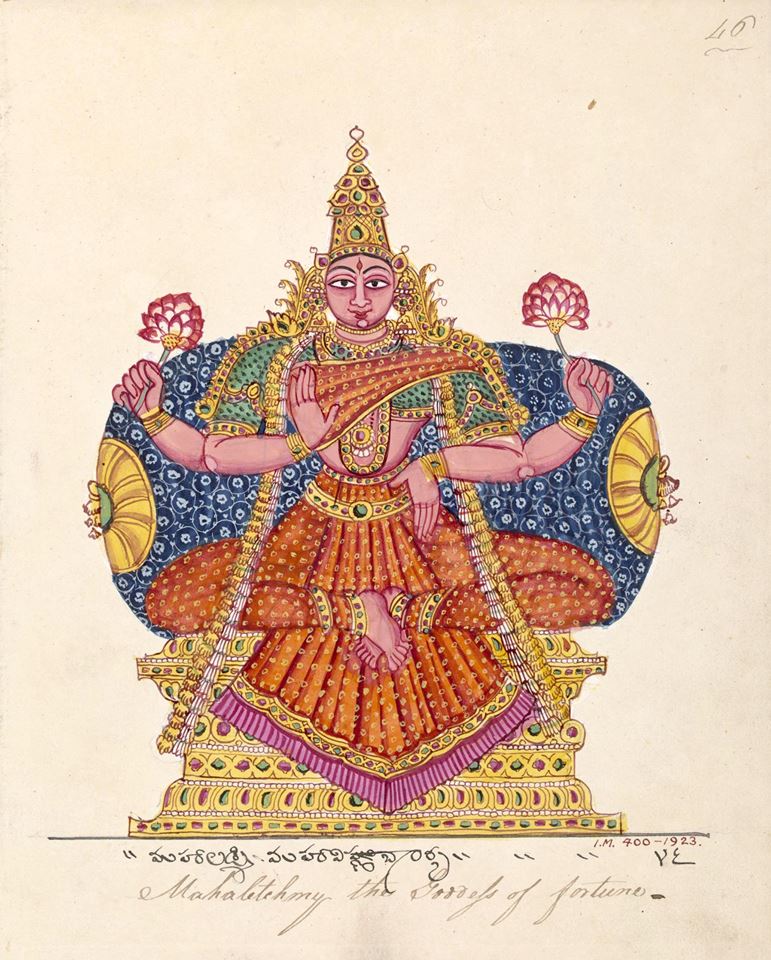
Goddess Lakshmi, consort of Vishnu, trichinopoly, ca. 1825. Painting
Gouache on watermarked paper. Marks and inscriptions: Mahaletchmy the Goddess of fortune.
Credit: Copyright: © Victoria and Albert Museum, London Rare Book Society of India
Domains which harm the treasury
-
bhava-10 = 12th ghosts-from-11th gains Leadership duties drain the energy out of marketplace profitability by replacing one's social associations with tightly structured public duties. Leaders have very little free time. Periods of karmesha-10 are usually income-losers as one is not free to build new connections and many of the old connections are lost. [Exception: being 11th gains-from-12th ghosts, bhava-10 can occasionally produce gains from dealings in foreign lands. Depends on the nativity.]
-
bhava-8 can produce windfalls -- but also, catastrophic losses. randhresha-8 brings inheritance when in occupation of bhava-4, but at the cost of the parents' health. Also randhresha-8 in bhava-5 may bring great material wealth, but often at the cost of infertility. randhresha-8 in bhava-9 similarly indicates early death of the parents, but some inheritance through them. Depends on overall nativity.
Neutral to treasury accumulation
-
bhava-7 = 9th wisdom-from-11th gains The partnering initiative of bhava-7 generally enhances the social networking which builds wealth, but it also drains off the family capital through outcome of values conflicts from partnering with outsiders, being 6th fight-from-2nd hoard .
-
bhava-12 = 2nd hoard-from-11th gains can produce tremendous capital, but the capital is stored in astral or imaginative form and not much useful on the material plane. This capital is not money but vision, imagination, conceptual thought, theory, first principles, research, interior guidance, hallucination, intuition, and knowledge of life after death. Very valuable capital indeed but does not manifest as material wealth.
1 = 12th ghosts-from-2nd hoard
Ironically perhaps the strongest agent for loss of holdings is the agent of eating which is the vital, moving, energy-burning physical body.
The mother-of-all-resources being of course FOOD, the dissolving agent is the annamayakosha = food-eating-body which consumes the stored assets.
If bhava-1 is stronger than bhava-2, the person can be an athlete, laborer, or other physical-based lifestyle who eats much more 'resource' than they are ever able to save.
dhana-bhava-2 hoard
bhava-2 Shukra= the storage -house for all "Skandha" * heaps of Accumulation over the course of multiple cycles of incarnations. bhava-2 = one's hoard of values = history - storage - restoration - stories
-
A primary basis of financial wealth is land ownership. 11th gains-from-4th roots = collected wealth gained (11) from the basis (lagna) of lands and buildings (4). (see more on bhava-4, below)
-
Typically profits from matters of 4 =lands and licensing = result in bhava-2 as "family money" which accrues over the generations via rents and increase of property values e.g capital gains = result from the sale of real-estate.
your family's wealth and status
your personal values as absorbed from extended family upbringing
your speech
your mouth, teeth, jaws, tongue
The food you eat (most basic form of financial wealth is certainly food)
your personal material assets
your moral and aesthetic values, taste in art and design
The extended family's full set of values including their wealth
banking, the bench, in the root sense of "holding in" (as in a river bank holding in the river, amoney bank holding in the money, etc.)
connection between money and speech is well known. The longer a family has held wealth, the more refined its speech and aristocratic values become

The money-changers
Combinations of dhanapati-2 and Vriddhi-pati-11
Total monetary affluence = a combination of:
-
" what you know" (family cultural values, bhava-2)
-
" who you know" (marketplace associations, bhava-11).
The yoga between 11th gains = incoming wealth -and- 2nd hoard = wealth retained -- will show the Learner 's lifetime, overall financial situation. Should dhanapati-2 and Vriddhi-pati-11 be juxtaposed in a shad-ashtaka 6-8 challenge-angle, less favorable financial results occurr.
For example, if a person is blessed with a favorable financial yoga such as dhanapati occupies 11, the Learner may be born into financially comfortable family circumstances, and through the money skills and values learned in that family, one will continue to produce one's own wealth throughout their adult lives.
QUOTATION ~~ BPHS, sarga-13, shloka-4
+ ++ Parivartamsha yoga of dhanapati-2 in bhava-11
+++ Vriddhi-pati-11 in bhava-2
+++ dhanapati-2 yuti Vriddhi-pati-11 in Kendra or trine
-
If Dhana lord is in Labha, while the lord of Labha in Dhana, wealth will be acquired by the native .
-
Alternately, these two lords may join in an angle or in a trine.
dhanapati-2 in bhava-11
QUOTATION from BPHS Shloka-2 3, sarga-24, Effects of the Bhava Lords
-
[quote] If Dhanu's lord is in Labha bhava, the native will have all kinds of financial wealth , be ever diligent, honorable and famous.[end quote]
dhanapati-2 in bhava-4 [bhava-2 = 11th gains-from bhava-4]
-
"If Dhana's lord is in Bandhu Bhava, the native will acquire all kinds of financial wealth ." - BPHS Sarga-34, shloka-16
entrepreneurial ruler of-3 occupies kalpasthāna-1
= self-made financial well-being . The pre-eminent house of self-made financial wealth is Sahaja-bhava-3 in radix.
Sahajabhava-3 = on the principle of bhavat bhavam = "2nd hoard-from-2nd hoard" compounded, self-developed wealth. the Learner takes stored wealth (2) and performs one further iteration with the capital, which is to develop it via commercial business. It is the narrative emerging from one's own mentality (3) which energizes the new manifestation of financial wealth from activities of busy-ness (business).
In order for bhava-3 to produce wealth, its basis = bhava-2 must be strong.
-
one must have access to capital with which to develop the commerce.
When bhava-3 is much stronger than bhava-2 but bhava-2 is not subject to prolonged repetition of the key structural elements of the learning pathway, then the predominant expression of financial treasury or knowledge wealth may come not directly from one's own family but rather via one's own personal commercial enterprise.
Sahajabhava-3 is typically strong in the nativities of entrepreneurs. Look for bhava-strengtheners such as bhava receives drishti from the rashi-pati , drishti from or inhabitation by the lagnesha giving social identification, drishti from Rahu-exciter, drishti from Guru-expander, and other varieties of strength such as a vargottamsha graha residing within (which means that when this bhava containing a vargottamsha graha receives a transit, the same narrative is triggered in all of the related 16-varga. )
Parivartamsha yoga of lagnesha-1 in bhava-3 + bhratru-pati-3 in bhava-1 = wealth through siblings
~~ BPHS Sarga-32, shloka-10
" If Labha's lord is in Sahaja Bhava, as Sahaja's lord is in Labha Bhava,
- one will gain wealth through co-borns
- and will be endowed with excellent ornaments."
~~ BPHS Sarga-34, shloka-39
" If Bandhu's lord is in Sahaja Bhava,
- the native will be valorous,
- will have servants,
- be liberal,
- virtuous and charitable,
- and will possess self-earned wealth.
- He will be free from diseases."
~~ BPHS Sarga-34, shloka-38
bandesha-4 in dhana bhava = 11th gains -from-svakshetra
" If Bandhu's lord is in Dhana Bhava,
-
the native will enjoy pleasures,
-
all kinds of wealth,
-
family life and honor,
-
and be adventurous.
-
He will be cunning in disposition. "
BPHS Sarga 16: Effects of Putra Bhava
"Dharma's Lord and Putra's Lord are capable of bestowing wealth.
Similarly Graha, yuti with Dharma's Lord and/or Putra's Lord are capable of bestowing wealth.
There is no doubt, that these Graha will give wealth during their Dasha periods."
5th Bhagya Bhava profiles
Financially privileged people at the elite levels are usually possessed of creative intelligence, and they have a super-powerful putra-putriki bhava in addition to strong amsha for 2nd hoard or 11th gainss . (See for example the philanthropist Wm. Gates Jr. )
-
Fame and fortune
-
children and self-expression
-
performance art = brilliant radiance in the center position
-
Genius of Divine origins
-
literature and authorship
-
All forms of personal creativity and procreativity
-
intelligence of Originality in individual thought; " genius."
Opulent wealth
bhava-5 Surya = Divine Light = intelligence = "genus " 4th roots-from-2nd hoard.
-
11th gains-from-7th trust = gains from partnership = generates wealth manifest in the form of children. Basis of financial well-being = genetics (reproduction); basis of financial wealth = genius (speculation) .
-
Profits from the basis of children, from spectacles (entertainments) and speculation (" spec" see, light), from intelligence, from games and gambling. Gambling occurs across the gamut of social classes = stock market," venture capitalism" , casino slot machines, street craps, and everything in between. Wealth manifest via putra bhava = highly enjoyable.
Poorva punya * "extra credit" accumulated from one's generous actions in parallel lives .
Purva-punya is usually represented by the fortunate 5th luck-rashi vidya-bhava, mantra-bhava, putra-bhava and 9th wisdom-rashi dharma-bhava, marga-bhava.
Dharma Bhava -9
The 9th wisdom harmonic = ultimate in Vedic thinking.
The" Bhagya " * fortunate * Dharma-bhava = the most auspicious house in the rashi chart. Dharma bhava = a"credit account"accumulated from good works in parallel lives.
The credit accrues from charitable works, doctrinal teaching, role-modeling of kindness, and otherwise assisting others to apprehend the presence of the Divine within oneself and in the reality of everyday life.
Helping others to know and retain the awareness of the ever-presence of Divine love is the supreme benefit. It is done by persons of high rank and low rank, rich and poor, man and woman, servants and kings, priests and peasants. Every act of kindness or truth-showing (wisdom does not speak but it does act) accumulates credit within dharmasthāna.
There is no such thing as random"luck" - but some people have extraordinarily fortune , due to their extraordinarily meritorious works in parallel lives . They've earned it!
Extraordinary configurations in the 9th wisdom house may indicate material wealth, but more likely will show tremendous wisdom.
That wisdom may well include -- but is never limited to -- the skills for generating material wealth.
-
Although the primary wealth of bhava-9 is knowledge, generally material circumstances which are the"downstream" of spiritual development will also be quite favorable.
Brihaspati's Dharma bhava-9 = the strongest of all wealth houses = 11th gains-from-11th gains + 5th luck-from-5th luck .
Natives with power in bhava-9 are typically members of the priesthood of world guides who are not in public view. They have access to massive resources.
-
the typical nativity with inordinate strength in bhava-9 will be a religious figure who is able to attract spectacular amounts of funding. However, the Learner rarely owns personal property. Often one wears the inexpensive robes of the avowed religious and has no concern for personal wealth whatsoever.
-
The financial well-being generated via bhava-9 is nearly always targeted to the development of higher intelligence and philosophical religion (5th luck-from-5th luck). Wealth from 9 tends to resource temples, spiritual centers, universities, and world-healing ventures.
-
Wealth = well-being. Guru = more of everything. the Learner with strength in 9 is exceptionally blessed with abundant well-being. However Guru is the enemy of Shukra and thus Guru does not support Shukra's agency for personal luxury (Laxmi). If the Learner enjoys personal luxury it either comes from another lagna or it is a value-neutral appendage of the central 9 activities, the Learner may be carried in luxury vehicles or sleep in swank hotels, but this sensual experience is arranged by the handlers (3) and not any preference or goal of the Learner .
Dharma-bhava related wealth yoga
Parivartamsha yoga (Exchange of rashi) between lagnesha-1 in house 9 AND Dharmesha-9 in bhava-1 AND Guru in bhava-7 [bhava-7= 11th gains-from bhava-9]
-
Should Lagna's Lord be in Dharma, as Dharma's lord is in Lagna, and Guru is in Yuvati, there will be gains of wealth and conveyances. - BPHS Sarga-29,
When [Guru = Dharmesha-9 ] + [karmesha-10 uttama] + [Dharmesha-9 yuti karmesha-10 in dharma bhava]:
-
8-10 Should Karma's lord be in exaltation and be in the company of Guru as Dharma's lord is in Karma the native will be endowed with h Onor, wealth, and valour.
[Guru-yuti-Budha + Chandra] in Dharma Bhava
-
7. Should Guru, Budha, and Chandra be in the 11th gains from Labha ( Dharma Bhava) the native will be endowed with wealth, grains, fortunes due to optimism, diamonds, ornaments, etc..
Bhava-11 profiles
-
behavior in the Marketplace "networking"
-
satisfaction of desires
-
gain of all possible types: income from salary, rents, royalties, commissions, dividends, etc.
-
gains of status and popularity
-
increased activity in the marketplace
-
Accomplishments for self and society
-
community development or gains for one's people as well as gains for the self
Scarcity-imposing Shanaicarya's Labha bhava-11 = the primary repository of earnings from the totality of the life force actions.
-
5th luck-from-7th trust = speculative, gaming, or entertainment intelligence of the partner. Strong graha here show gains from the genius of the partner.
A major source of economic gain may be 11th-from Arudha Lagna .
Wealth from other domains (3, 4, 6, 8)
Bandhu bhava-4 = is not a primary financial-wealth bhava per se. However, see bhava-2 above. Owned-stewarded properties (Gk. propos = "my own, mine" ) constitute the basis of most wealth because bhava-2 = 11th gains from-2nd hoard. Bandhu bhava-4 "bondage, bonding" roots. Owned-stewarded properties acquire value after they become commodities in the marketplace (11).
-
Portfolio of bhava-4 = land ownership and real property such as buildings and fields, as well as vehicles. bhava-4 also represent one's schooling in cultural customs.
The fruits (11) of schooling are placed in the 11th gains-from-4th roots = dhana bhava. Therefore, the core cultural education of 4 (not the higher philosophical education of 9) . Should the Learner not be born into a family of real property owners, there is another aspect of the 4th roots house available to constitute the foundation (4) of financial wealth , and that is education.
Ripu bhava-6 = 5th luck-from-2nd hoard (speculative development of existing capital) and 2nd hoard-from-5th luck (accumulation as result of intelligence) can be a wealth house. Wealth will be the result of financial transactions featuring the skillful use of debt, e.g., taking loans.
Ayurbhava-8 = "other people's hidden money" when combined with factors from 4-5-Surya-Chandra can produce a huge inheritance or alimony settlement.
An Accountable Woman
There = man who had worked all of his life and had saved all of his money and was really tight when it came to his money.
He loved money more than just about anything, and just before he died, he said to his wife,"Now listen. When I die, iwant you to take all my money and put it in the casket with me. Iwant to take my money to the afterlife with me."
And so he got his wife to promise him with all of her heart that when he died, she would put all of the money in the casket with him.
Well, he died. He was stretched out in the casket, his wife was sitting there in black, and her friend was sitting next to her. When they finished the ceremony, just before the undertakers got ready to close the casket, the wife said,"Wait a minute!"
She had a box with her, she came over with the box and put it in the casket. Then the undertakers locked the casket down, and they rolled it away.
So her friend said"Girl, iknow you weren't fool enough to put all that money in there with your husband."
" I am a GOOD WOMAN, ican't go back on my word. Ipromised him that I was going put that money in that casket with him."
" You mean to tell me you put all that money in the casket with him?"
" I sure did," said the wife."I wrote him a check."
Parivartamsha yoga of the debt-making rogesha-6 + the gainful Vriddhi-pati-11 causes some loss
-
loss of wealth will come to pass during the 31st birth year if Labha and 6th fight lords exchange their Rashis.
Immorally obtain or criminal wealth
Unfortunately, great temporal wealth can be created by wrong methods, such as stealing, lying, fraud, exploitation, and various criminal means.
-
The drug kingpins and prostitution lords of the international criminal gangs generally have strong 6th fight, 8th weird and 12th ghosts rashi configurations,
-
indicating that they are having temporary material gain which creates a terrifying spiritual loss.
They can look forward to future lifetimes enslaved to pre-incarnationally planned repayment.
Marriage as a primary container of Capital
kalatra-karaka Shukra = also the primary dhanakaraka. A strong Shukra indicates wealth, diplomacy, and a profound understanding of the material value of marriage.
For example, during the very public marriage crisis faced by POTUS-pair-42 + USA Secy State 1947- Hillary Clinton due to her then-president husband's flagrant sexual misconduct, she nevertheless maintained the marriage and never resorted to divorce.
-
Mrs. Clinton's Shukra-3"promises and trusts " rules her dominant [uchcha] Rahu-10 suggesting substantial wealth accrued from public leadership roles (10) and from a wide variety of communications activities (3). Wealth is conserved by * not* breaking trusts.
Shukra's dominance in her life at the time of the marriage crisis determined that she would conserve [Shukra] the financial, political and social capital [Shukra] of her marriage rather than react in litigious anger.
Indeed her decision to maintain trust [Shukra] during the catastrophe laid the financial, political, and social (and moral) foundation for an exceptionally influential career in public service, which followed the end of her personal crisis.
14th Dalai Lama 1935- Policy of Kindness Tenzing Gyatso
-
Healing Anger: The Power of Patience from a Buddhist Perspective
- Trans. Geshe Thupten Jinpa. p.32
" Greed is a form of desire. However, it is an exaggerated form of desire, based on over-expectation.
The true antidote of greed is contentment.
For a practicing Buddhist, for a Dharma practitioner, many practices can act as a kind of counterforce to greed :
- the realization of the value of seeking liberation or freedom from suffering,
- recognizing the underlying unsatisfactory nature of one's existence, and so on.
These views also help an individual to counteract greed.
But in terms of an immediate response to greed, one way is to reflect upon the excesses of greed, what it does to one as an individual, where it leads.
Greed leads one to a feeling of frustration, disappointment, alot of confusion, and a lot of problems.
When it comes to dealing with greed, one thing which is quite characteristic is that
- although it arises from the desire to obtain something,
- it is not satisfied by obtaining it.
- Therefore, it becomes limitless or boundless, and that leads to trouble.
The interesting thing about greed is that although the underlying motive is to seek satisfaction, as I pointed out, even after obtaining the object of one's desire, one is still not satisfied.
On the other hand, if one has a strong sense of contentment, it doesn't matter whether one obtains the object or not; either way, one is still content."
Affluence from Genius, speculative Finance, intelligence, Games, Gambling, Entertainments, amusements, and Adventures
Winnings from Lotteries, speculative investments, venture capitalism funding unproven new businesses, or gambling -- whether in casinos, on street curbs or in the stock market -- may occur in periods of the lord of bhava-5.
Sometimes too, speculative wealth may emerge during the period of a fortunate graha which resides in putra bhava; also less frequently but nevertheless possibly if the 5th-from-5th bhava-9 is strong, great luck during periods of Dharmesha-9 .
bhava-5 and its lord = luck
-
Luck tends to produce the results characteristic of the bhava-pati.
-
When Shani = lord of 5 (Tula and Kanya lagna)"luck" tends to follow discipline.
-
the Learner believes that work is the key to "winning" .
-
As the golfer Gary Player famously said, "the more I practice, the luckier I get."
When Guru = Vidyapthi-5, (Simha and Vṛścika indriya-lagna) speculative wins are easier to achieve due to the Learner 's positive beliefs and expectations about one's "chances " in gambling, including political elections and winning of prizes. If vidya-pati-5 Guru is well-placed, the Learner may be highly optimistic and consistently lucky in life.
Naturally, the most auspicious lord for the obtainment of financial wealth through creative speculation (gambling) is the money-karaka, Shukra .
Shukra being Vidyapthi-5, mithuna indriya-lagna and Makara indriya-lagna may be exceptionally lucky in winning political campaigns (5) and being well paid for creative endeavors
as well as amazing gain of financial wealth through stock market activities
-
Microsoft 1955- philanthropist Bill Gates material affluence, due largely to stock investments = [uchcha- Shani, Shukra-Tula, and [nīcha-bhaṅga-Surya] = in [4, infrastructure, secure foundations] while Mangala ruler of Rahu- 5-stock-market occupies 3-commerce.
vs.
Creativity, inspiration, Genius and Good Luck (5)
For example: Pulitzer Prize, Newbery Medal, nobel Prize, Grammy, academy Award for film (Oscar), congressional Medal of Honor, et-cetera are achievement awards sometimes carrying a large financial gift yet granted in recognition of work already completed. These prizes are earned by those whose noble efforts in their field have gained social recognition.
See particularly Rahu in bhava-11 = one who earns a material and social profits income-pay, dividends, prizes for work accomplished, awards, trophies, and other emblems of recognition for success of efforts already expended .
By contrast, the"bhaga" fortune emitting from bhava-5 is the result not of work accomplished (Shani, natural lord of 11). Rather it is a result of charisma, confidence, or genius (Surya, natural lord of 5).
Typical of Surya, no work is necessary to produce the lucky effects of acting on inspiration. However, the ability to open a strong personal channel for Divine Light is essential.
The celebrated creative high intellects of every age of have radiated a bright, sparkling aura of certainty in the rightness of their being. Neither social oppression nor self-doubt afflict their pursuit of independent thought.
Their 'work' while often enormously time-consuming is rarely laborious and usually delightful. fortune experienced by these genius figures = generally , the result of being in the right place, at the right time, with high confidence and high entitlements.
According to the empowerment of bhava-5 and its lord, sometimes the allocated stroke of luck is quick and isolated, . But sometimes there is a lifetime of continuous fortune , which accompanies an extraordinary infusion of Divine Intelligence into the human soul.
When a person is consistently in the right place and the right time with the right ideas and the right resources at their disposal, while the dark clouds of ignorance, fear and resistance to inspiration have been banished, the effects of good actions toward others in parallel lives are presently bearing the expected favorable fruit.
" The lottery is a special tax for those not good at math."
In the 1720's, de Mundi Systemate 1643-1727 Isaac Newton, the famous physicist and Royal Master of the Mint, lost some of his considerable investment capital monies due to speculation in stock holdings of The South Sea Company.
-
He lost over 20,000 pounds sterling (£1.9 million in today's money) which surely put a dent in his fortune.
As a result of this crisis, he stated, "I can calculate the motions of heavenly bodies, but not the madness of people" .
Financial ups and downs
Much more common than a lifelong upward trajectory of ever-increasing hoard are nativities which feature temporary gains due to an auspicious mahadasha or dasha-bhukti combination.
Gains may be followed by losses, or vice versa.
Periods of vidya-pati-5 and Dharmesha-9 are always auspicious, bringing children, personal creativity, and wisdom leading to confident decisions which enhance well-being. One component of well-being is the"weal" (wellness) which includes a component of material wealth.
-
Periods of vidya-pati-5 indicate empowered channeling of divine intelligence. Periods of Dharmesha-9 indicate support from helpful guiding spirits.
Periods of the lords of the 2nd (hoard) or 11th (gains) frequently bring material gains through application of lineage knowledge (2) and mutually profitable friendships within the marketplace (11).
Periods of lord of 8th (the weird) or lord of 12th (ghosts) lords may bring loss of material acquisitions, caused by sudden, forced changes (8) or waning interest in the material identity (12).
QUOTATION from Alexis de Tocqueville, Democracy in America
" What is the most important for democracy is not that great fortunes should not exist,
but that great fortunes should not remain in the same hands."
Q:
Dear Madame, iam consumed by a desire for wealth and I hope you will tell me when I can expect to realize this dream of mine. Since many years, I have fantasized about millions perhaps billions of dollars. Idream of employing thousands of workers. Iwant to own cities and towns, cargo ships and railcars, factories and office buildings. Iunderstand Donald Trump 's attraction to luxury office towers because I too want to own skyscrapers - several of them - with my name in gold letters over the doorway. Madame, ican see it in my mind's eye. Icome from a very poor background. My father suffered alcoholism and beat my mother violently. Indeed we were too poor to buy food at times and I remember my mother being in some compromising situations. It was horrible. Iam happy to say that she is better now and my father has passed, which means I hope that I am free to build my dream of huge wealth that will provide jobs, health, and security for thousands if not millions of people. Do you see it in my chart? And when?
A: Namaste,
Cultural narcissism is very widespread around the world. Yet, usually when one is driven by a truly burning Egoic-Mind-desire for money, fame, and respect from outsiders, the passion = compensatory not authentic.
Excessive or compulsive [Rahu] seeking of material acquisition = generally a symptom of low self-worth.
The Learner may feel lacking in value, a diminished human importance, and low self-regard on the inside. The hallucinating Egoic-Mind then over-compensates by making a flamboyant display of value on the outside.
Usually, Rahu the Poseur is involved in these passionate desires to appear to possess more value than one truly has.
Sincere self-worth free of self-criticism = likely to naturally attract material treasuries.
Financial well-being and psycho-emotional well-being are an energetically matched pair.
Try to look inside and find the deep emotional wound that is driving all of this Rahu-desire for skyscrapers and gold letter nameplates. Even if you do achieve a high level of capitalization or social prestige, it is sadly true that sensual pleasure and the praise of outside people are fleeting at best;.
Like refined sugar they are sweetly delicious for one moment, then the hunger instantly returns. No amount of material treasure will - in itself - ever make a person happy. However, if the self-worth is high, the external wealth can be lovely.
If one appreciates the beauty and value of one's own birthright as a child of the Divine Love-Light, any external production-collection of valuable commodities serves as a tangible proof of the blessings of the Divine. Not the source of those blessings, but a reflective image of the internal source.
Money combined with charity, money combined with education , money combined with good works, good intentions, and good design - yes, money combined with higher purposes can do wonderful things!
But by their secondary nature , capital treasury and material property ownership-stewardship - fixed properties (4) and moveable collections (2) -- cannot possibly provide the sole basis for happiness.
Hap is an English noun that means the way things are, the occurrence. (happen, happenstance, haphazard, mishap, happy). Happiness is just being with the way things are. No striving. Just being.
Happiness comes only from inside.
Years ago, areading was requested by a fellow who declared that he owned California vinicultural properties valued at USD-27 million. It is true that in the wine industry at that time historically, 27-millionUSD = perhaps less than fully adequate to manage and develop successful vineyards through climate variation and fluctuations of economic cycles. But double that, perhaps 60 million, would be a substantial capitalization in that industry (or it was at the time).
The wine industry was doing well and it was reasonable to expect that his net worth would keep increasing. Soon he would own all the property and equipment that he would need to operate a prosperous winemaking business. The nativity supported robustly positive relationships with bankers and plenty of profit from wines (Vrishabha on 10th law navamsha and Shukra very well disposed in radix.)
However, this man told me that he could not be satisfied until he had at least USD_1 billion, since for him 27 million felt like a worthless street-sweeper.
His life's desire was to gain membership in an elite association with the top financial investors, where he imagined he would get some real recognition and respect.
He wanted to know when and where he would hit the magic 1-billion mark which for him would mean finally real happiness.
Until that day arrived, he felt miserable each day. He chanted a daily litany of criticizing himself for wasting time on small matters and feeling that he was not really successful.
Despite his remarkable business intelligence, he = pitiable creature. An impoverished fisherman living in a hut would have been happier on a day-to-day basis than this fellow was.
It came out in the follow-up that he had suffered humiliation and disregard from his fathers-side relatives when growing up, when his mother was thrown out with her children on the street and they lived like beggars.
He was determined to get big and strong and rich and SHOW THEM how much he was WORTH.
Naturally his never-satisfied worth-fantasies depended on getting respect from males (father-side, decision-makers) and getting control of infinite monies to ensure that his mother was never humiliated again.
This humiliation script was looping over and over again in his subconscious, but he never looked inside to find the engine that was driving his insatiable desire for money. Even with USD_27million net worth he felt personally unsatisfied, invalidated, and powerless like a beggar.
Since he never addressed the inner wounds that were causing hisEgoic-Mind distress, his 27-million still felt unworthy, like a pauper and he became more unhappy each day, striving to get more more more external validation but never feeling healed. The last news on this case was that his vineyard had burned in a tragic fire, destroying his investment, but that it was re-growing.

Material wealth hoard = always a result, never a cause
Whenever I am asked about money fantasies like winning a huge lottery, the mythical "big break" or any sudden external event which supposedly will create instant and complete personal validation, ialways wonder what sort of egoic-mind injury the person is trying to compensate.
Remember that money is the result of doubt-free inner worth;
material assets cannot cause one to acquire worthiness.
The cause of financial wealth must lie within.
when might my financial-situation start looking better/good?
A:
It is not possible to answer value-laden questions such as better/good, since these values are in the eye of the beholder.
The external worth is an outcome of the internal worth. thus the best method of increasing the external worth is to develop a rich appreciation of one's internal worth.
Tirukurrala, aras.
Sarga-48
" Let your charity be in conformity with your wealth - that is the way to preserve it."
QUOTATION from Tenzing Gyatso
Generous Wisdom: Commentaries on the Jatakamala ,
trans. Tenzin Dorjee, ed. Dexter Roberts
Truly Solving Problems
"We feel that money and power can bring happiness and solve problems ,
but they are not definite causes of those desired states.
If that were so, it would follow that those who have wealth would necessarily have happiness,
and those who do not have wealth would always experience suffering.
-
Money and powerfacilitate , but it is clear that they are not the primary causes of happiness and solving our problems.
-
It is justified for us to make material and financial development for building our nation and providing shelter, etc. for ourselves; we need to do that.
-
But we also need to seekinner development .
As we can see, there are many people who have wealth and power who remain unhappy, due to which their health declines, and they are always taking medicines.
-
On the other hand, we find people who live like beggars but who always remain peaceful and happy.
Therefore,
in our daily life
a certain way of thinking makes us happy,
and a certain way of thinking makes us unhappy .
In other words, there are certain states of mind which bring us problems, and they can be removed; we need to make an effort in that direction.
Likewise, there are certain states of mind that bring us peace and happiness, and we need to cultivate and enhance them."
Economically thinking outside the box
Young Chuck moved to Texas and bought a donkey from a farmer for $100.00.
The farmer agreed to deliver the donkey the next day.
The next day he drove up and said, "Sorry son, but I have some bad news. The donkey died ."
Chuck replied, "Well, then, just give me my money back."
The farmer said, "Can't do that. Iwent and spent it already."
Chuck said, "Ok, then, just bring me the dead donkey."
The farmer asked, "What ya gonna do with him?
Chuck said, "I'm going to raffle him off."
The farmer said, "You can't raffle off a dead donkey!"
Chuck said, "Sure I can. Watch me. Ijust won't tell anybody he's dead."
A month later, the farmer met up with Chuck and asked, "What happened with that dead donkey?"
Chuck said, "I raffled him off. Isold 500 tickets at two dollars a piece and made a profit of $898.00."
The farmer said, "Didn't anyone complain?"
Chuck said, "Just the guy who won. So I gave him his two dollars back."
[How Readings Work] = [Sample Sacred Jewels Ratna Recommendation] = [Seva]
 file update =
01-Mar-2026
file update =
01-Mar-2026
[Copyright © 1994-2034 by Barbara Pijan Lama] = [Contact] = [How to Request a Jyotishavidya Reading]
Barbara Pijan Lama Jyotishavidya Vedic Astrology Surya Sun Chandra Moon Mangala Mars Budha Mercury Guru Jupiter Shukra Venus Shani Saturn Rahu Ketu Graha Planets Dasha Timeline Calendar Nakshatra Navamsha Marriage Children Treasury Career Spiritual Wisdom Cycles of re-Death and re-Birth
The information on barbarapijan.com, including all readings and reports, is provided for educational purposes only. Wishing you every happiness and continuing success in studies!

